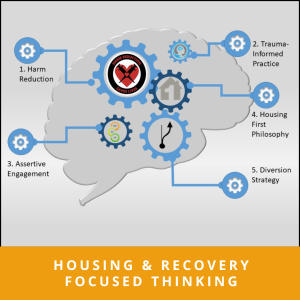Housing & Recovery Focused Thinking: Shifting the “Managing” Homelessness Mindset
 About this Training:
About this Training:
It is best practice in addressing homelessness, to shift from a focus of “managing” it to one of “ending” it. We have all heard this quote, or at least some variation of it, “we cannot solve problems using the same thinking as when they were created.” One way to define “managing” homelessness is doing whatever possible to help people experiencing homelessness and those around them to be more comfortable and/or safe while people remain in their homeless state. That thinking must change if we are going to actually reduce and eventually end homelessness! Instead, we have to incorporate a focus on recovery and helping people move toward stability while providing opportunities for those experiencing homelessness to believe it is possible which in turn reaps actions that mirror that belief. We must continually work to assist and support people in that shift to situations and thinking more conducive to recovery. And this is only possible if those providing the support also think, communicate, and act with the same focus. Instead of a short sighted goal of clean socks and access to shelter and a soup kitchen, we enter each relationship with those experiencing homelessness with thoughts of how we can support them to move away from these homeless vacuums and toward housing and other person-centred goals. All levels of engagement should include language, tools, and a belief that these things are not only beneficial, but possible.
| Instructor Led (In-person and virtual options) |
|
Training Audience: This training is appropriate for:
Training can be tailored according to attendees and the community or system involved. Note – The TTA requests that all training include at a minimum, one member of leadership from each organization/agency represented, be present as a learner. |
|
Training Length: In-Person: 1 Day without Diversion component (8 hrs including content, breaks, lunch) – 2 Days with Diversion component (16 hours including content, breaks, lunch) |
|
Training Capacity: In-Person: 40 maximum / 8 Minimum |
|
Training Objectives: In this training, participants will:
If Diversion training is added, see that description for those training objectives. |
|
Training Features: In-Person:
Virtual:
Both:
|
|
Training Prerequisite Onboarding Modules: Mandatory: None |
|
Certificate of Completion: Through the TTA LMs, attendees will have the ability to receive a certificate of completion for the training. Attendees must be present for the full training to do so. To receive a certificate, attendees must complete and pass a final knowledge check/assessment (within 30 days post training).
|
|
Training Costs: Please inquire using the “Request More Info” button to the right regarding fees. Please note that all fees quoted should be considered an “all-inclusive” cost which means there would be no additionl costs for travel, prep, admin, or other items added to the rate provided to you with the exception of provincial tax. Members: A system, community, or organization can become a “Member” by purchasing an annual subscription to self-paced online onboarding modules. Discounts on live training are available determined by the subscription package chosen. (See “Onboarding Module” section here). |
This training will provide participants with the understanding and tools to make this paradigm shift and therefore, support people to have a better quality of life and progress on the path of whatever recovery looks like to them. To do this we will first help to dispel some of the more common and barrier-creating myths about homelessness. To have the appropriate thinking focus, It is necessary to have an understanding of the actual picture of homelessness including root causes which helps to erase popular yet harmful stereotypes about people experiencing homelessness. Participants will explore what we suggest are important support perspectives to challenge personal beliefs and understanding. Learners will then delve into what we believe is a solid “Housing Focused Framework” which contains various examples of tools and practices that assist support people, organizations, and systems to be recovery-oriented in their approach. Core elements of this framework include:
- Harm Reduction
- Trauma-Informed Practice
- Assertive Engagement
- Housing First Philosophy
- Diversion
Each of these will be discussed in greater detail which aids in developing a clearer understanding of what is required to work from a recovery-oriented, housing-focused mentality, which then results in those you support moving toward recovery as opposed to stagnating longer in their homeless state. We know that the minute people enter a shelter the more likely they are to remain homeless and the longer they are homeless the more difficult it is to leave that state. A recovery-oriented approach serves as an antidote to that.
Diversion is a specific strategy and best practice within homeless serving systems designed to prevent people from entering that system, or more importantly, a shelter system, in the first place. It is solution-focused and centres on finding support for those on the doorstep of homelessness. It would be our recommendation for organizations or systems wishing to bolster or integrate a diversion practice, that a full diversion training be added to this one which would then make this a two-day training. You can learn more about Diversion training here.
